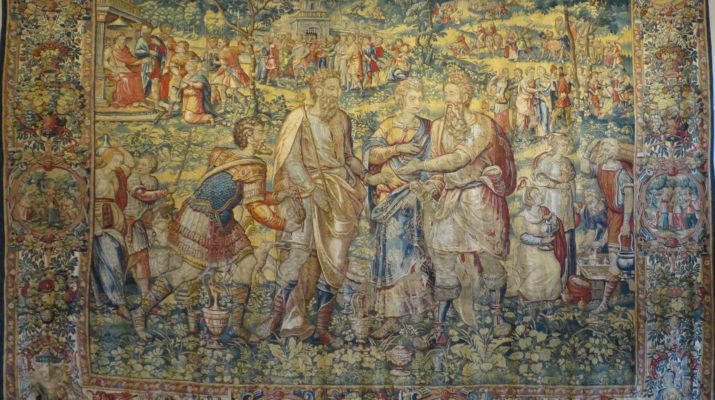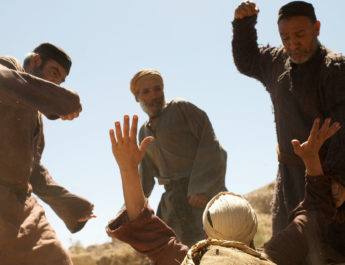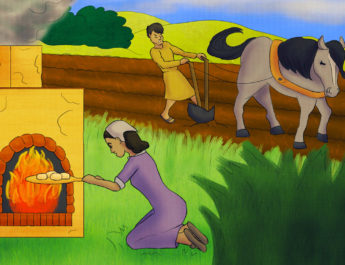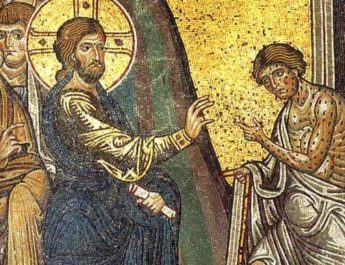Genesis 20
BibleHub
1 From there AbrahamA journeyedB toward the regionC of the Negeb,D
Notes on verse 1a
A “Abraham” = Abraham. From the same as Abiram (exalted father, a high father – lofty) {from ab (father literal or figurative) + rum (rise, bring up, being high, extol, exalt, haughty; to raise in a literal or figurative sense)}. This is Abraham, father of many nations or father of a multitude.
B “journeyed” = nasa. This is properly pulling up as when one pulls up tent pegs or stakes. This would imply striking tents in order to start a journey. So this could be bring, pullout, set out, journey, or cause to go away.
C “region” = erets. Root may mean to be firm. This is earth, ground, field land, or country.
D “Negeb” = Negeb. Root may mean to be parched. The Negeb is the south country – sometimes used to refer to Egypt. This is a land that suffers from a lot of drought.
and settledE between KadeshF and Shur.G While residing in GerarH as an alien,I
Notes on verse 1b
E “settled” = yashab. This is to sit and so to remain and so to dwell. It is sitting for any reason – as a judge, in order to ambush, or just sitting quietly. Causatively, this can mean settling or marrying. This can also mean continue, endure, or establish.
F “Kadesh” = Qadesh. 18x in OT. From the same as qodesh (set apart and so sacred; God is different from us and so God is holy/set apart; things we dedicate to God’s service are set apart for God and so they, too, are holy, etc.) This is Kadesh, a place whose name means sacred or sanctuary.
G “Shur” = Shur. 6x in OT. Perhaps from shur (to travel, turn, journey; travelling like a prostitute or a merchant) OR from shur (to excite, to rise up). This is Sur, a desert place in eastern Egypt. It may mean “wall,” “bull,” or “fortification.” See https://www.abarim-publications.com/Meaning/Shur.html
H “Gerar” = Gerar. 10x in OT. From garar (to drag or drag off in a rough fashion, chew, sweep, destroy; to chew the cud). This is Gerar, south of Gaza, perhaps “rolling country,” “dragging,” “lodging place,” or “sojourning.” See https://www.abarim-publications.com/Meaning/Gerar.html
I “residing…as an alien” = gur. Properly, this is the act of turning off the road for any reason. So, it means sojourning, becoming a guest. It can mean being fearful since one is outside of home territory. It can also mean dwelling, living, or inhabiting if one has turned off the root to encamp for a longer duration. This word is where the Hebrew “ger” comes from, which is the word translated “stranger” or “resident alien.”
2 Abraham said of his wifeJ Sarah,K “She is my sister.”L
Notes on verse 2a
J “wife” = ishshah. From ish (man); perhaps from enosh (human, humankind, mortal); from anash (to be weak, sick, or frail). This is woman, wife, or female.
K “Sarah” = Sarah. From the same as Saray (princess, mistress, noble lady, queen); from sar (chief, ruler, captain, official, prince). This is Sarah, meaning princess.
L “sister” = achot. From the same as ach (brother, kindred, another, other, like). This is sister in a literal or figurative sense. It can also mean another or together.
And KingM AbimelechN of Gerar sentO and tookP Sarah.
Notes on verse 2b
M “King” = melek. Related to “Abimelech” in v2. See note N below.
N “Abimelech” = Abimelek. Related to “Abraham” in v1. From ab (see note A above) + melek (king, royal). This is Abimelech, meaning “father is king.”
O “sent” = shalach. This is to send out, away, send for, forsake. It can also mean to divorce or set a slave free.
P “took” = laqach. This is to take, accept, carry away, receive. It can also have the sense of take a wife or take in marriage.
3 But GodQ cameR to Abimelech in a dreamS by night,T
Notes on verse 3a
Q “God” = Elohim.
R “came” = bo. This is to enter, come in, advance, fulfill, bring offerings, enter to worship, attack. It can also have a sexual connotation.
S “dream” = chalom. From chalam (properly, to bind solidly and so to be plump; to be healthy or strong, to recover; figuratively, to dream). This is a dream or dreamer.
T “night” = layil. Properly, this refers to light twisting away. It is used for night or midnight. Figuratively, this can mean adversity.
and said to him, “UYou are about to dieV because of the womanW whom you have taken; for she is a married woman.”X
Notes on verse 3b
U {untranslated} = hinneh. From hen (lo! Behold! If, though; an expression of surprise). This is to draw attention, show suddenness or surprise, or to emphasize the importance of the coming statement. See! Lo! Behold!
V “die” = mut. This is to die in a literal or figurative sense. It can also refer to being a dead body.
W “woman” = ishshah. Same as “wife” in v2. See note J above.
X “is a married woman” = baal + baal. Literally “is married to a man.” Baal is 15x in OT. This is to marry, master, become a husband, have power over. Baal is related to the first baal in v3. From baal (see above). This is lord, owner, ally, master, or archer.
4 Now Abimelech had not approachedY her; so he said, “Lord,Z will you destroyAA an innocentBB people?CC
Notes on verse 4
Y “approached” = qarab. This is to come near, offer, make ready, approach, take.
Z “Lord” = Adonai. From adon (lord, master, owner); root means to rule or be sovereign. This is the actual Hebrew word for Lord used (in a different form) of humans and (in the present form generally) of God. It means someone who is in control.
AA “destroy” = harag. This is to strike with deadly intent so it can be kill, destroy, murder, or put to death.
BB “innocent” = tsaddiq. From the same as tsedeq (rightness, righteousness, just cause, vindication; that which is right in a natural, moral, or legal sense; abstractly equity; figuratively prosperity). This is just, innocent, righteous, righteous one, or lawful.
CC “people” = goy. From the same root as gevah (the back, person, or body); related to gev (among); related to gaah (to rise up). This is nation or people. Often used to refer to Gentiles or foreign nations. It can also be used figuratively for a group of animals. This is where the Yiddish “goy” comes from.
5 Did he not himself say to me, ‘She is my sister’? And she herself said, ‘He is my brother.’DD I didEE this in the integrityFF of my heartGG and the innocenceHH of my hands.”II
Notes on verse 5
DD “brother” = ach. Related to “sister” in v2. See note L above.
EE “did” = asah. This is to make, do, act, appoint, become in many senses.
FF “integrity” = tom. From tamam (to finish or accomplish; to make perfect, demonstrate that you are upright; consume; to complete in a literal or figurative sense). This is completeness or full measure. So, it can be blameless, moral innocence, prosperity, or integrity. Also used to refer to a portion of the high priest’s breastplate.
GG “heart” = lebab. May be related to labab (to encourage; properly, to be encased as with fat; used in a good sense, this means to transport someone with love; used in a bad sense, it can mean to dull one’s senses). This is the heart, courage, one’s inner self, the mind, or the will. Heart is only used in a figurative sense in the Old and New Testaments.
HH “innocence” = niqqayon. 5x in OT. From naqah (to be empty, cleanse, acquit; to be clean in a literal or figurative sense). This is cleanness, clearness, or innocence.
II “hands” = kaph. From kaphaph (to bend – from a root meaning curve or bend down). This is palm of the hand or sole of the foot, footstep, grasp. Figuratively, it can also mean power.
6 Then God said to him in the dream, “Yes, I knowJJ that you did this in the integrity of your heart; furthermore it was I who keptKK you from sinningLL against me. Therefore I did not letMM you touchNN her.
Notes on verse 6
JJ “know” = yada. This is to know, acknowledge, advise, answer, be aware, be acquainted with. Properly, this is to figure something out by seeing. It includes ideas of observation, recognition, and care about something. It can be used causatively for instruction, designation, and punishment.
KK “kept” = chasak. This is to restrain, refrain, or hold back. It can mean to spare, to preserve or to punish, depending on the context.
LL “sinning” = chata. This is properly to miss, and so figuratively it is used for sinning, bearing the blame. It implies a forfeiture or loss of something.
MM “let” = natan. This is to give, put, set, offer. It is to give literally or figuratively.
NN “touch” = naga. This is touch, reach, arrive, come near, strike. This is touching for any reason including sexual or violent.
7 Now then, returnOO the man’sPP wife; for he is a prophet,QQ
Notes on verse 7a
OO “return” = shub. To turn back, return, turn away – literally or figuratively. Doesn’t necessarily imply going back to where you started from. This is also the root verb for the Hebrew word for repentance “teshubah.”
PP “man’s” = ish. Related to “wife” in v2. See note J above.
QQ “prophet” = nabi. This is prophet, prophecy, speaker, or someone inspired.
and he will prayRR for you and you shall live.SS But if you do not restoreTT her, know that you shall surely die,UU you and all that are yours.”
Notes on verse 7b
RR “pray” = palal. This is to judge for oneself or in an official capacity. It can also mean to pray or make supplication, to entreat.
SS “live” = chayah. This is to live or keep alive in a literal or figurative sense. So, it an be revive, nourish, or save.
TT “restore” = shub. Same as “return” in v7. See note OO above.
UU “surely die” = mut + mut. Same as “die” in v3. See note V above. The word is repeated twice – the first time as an Infinitive Absolute. The Infinitive Absolute serves to emphasize the sentiment of the word. It is rather like Foghorn Leghorn’s speech pattern, “I said, I said.”
8 So Abimelech rose earlyVV in the morning,WW and calledXX all his servantsYY
Notes on verse 8a
VV “rose early” = shakam. This is leaning one’s shoulder into a burden or load, whether a person or an animal. Thus, it meant starting or rising early.
WW “morning” = boqer. From baqar (to seek, plow, break forth, admire, care for). This refers to the break of day. So it is dawn, early, morning, or morrow.
XX “called” = qara. This is to call or call out – to call someone by name. Also used more broadly for calling forth.
YY “servants” = ebed. From abad (to work, serve, compel; any kind of work; used causatively, can mean to enslave or keep in bondage). This is a servant, slave, or bondservant.
and toldZZ them all these things;AAA, BBB and the men were very much afraid.CCC
Notes on verse 8b
ZZ “told” = dabar. This is generally to speak, answer, declare, or command. It might mean to arrange and so to speak in a figurative sense as arranging words.
AAA “things” = dabar. Related to “told” in v8. From dabar (see note ZZ above). This is speech, a word, a matter, an affair, charge, command, message, promise, purpose, report, request. It is a word, which implies things that are spoken of in a wide sense.
BBB {untranslated} = ozen. Literally “in their hearing.” This is ear, hearing, audience, show. Properly, it is broadness – applied to its ear in reference to its shape.
CCC “were…afraid” = yare. This is to fear, be afraid, dreadful. It can also refer to fearful reverence – to fear in a moral sense is to say to revere, respect.
9 Then Abimelech called Abraham, and said to him, “What have you done to us? How have I sinned against you, that you have broughtDDD such greatEEE guiltFFF on me and my kingdom?GGG You have done thingsHHH to me that ought not to be done.” 10 And Abimelech said to Abraham, “What were you thinkingIII of, that you did this thing?”
Notes on verses 9-10
DDD “brought” = bo. Same as “came” in v3. See note R above.
EEE “great” = gadol. From gadal (to grow up, become great, become wealthy – to advance. The root meaning may be to twist in the sense of the process of growing). This is great, high, bigger, noble, old, marvelous. It can also refer to someone who is powerful or distinguished.
FFF “guilt” = chataah. Related to “sinning” in v6. 8x in OT. From chata (see note LL above) OR from chet (sin, fault, or punishment of sin); {from chata (see above)}. This is a sin or sin offering.
GGG “kingdom” = mamlakah. Related to “Abimelech” and “King” in v2. From the same as melek (see note N above). This is kingdom, dominion, sovereignty, rule. It can also refer to the realm.
HHH “things” = maaseh. Related to “did” in v5. From asah (see note EE above). This is a word – any action whether positive or negative. It can also be a transaction, construction, activity, property, or something that is produced.
III “thinking” = raah. This is to see in a literal or figurative sense so stare, advise, think, view.
11 Abraham said, “I did it because I thought,JJJ There is no fearKKK of God at all in this place,LLL and they will killMMM me because ofNNN my wife.
Notes on verse 11
JJJ {untranslated} = raq. From the same as raq (thin, surely, only); perhaps from raqaq (to spit). This is but, except, at least. In the sense of being thin, it figuratively refers to some kind of limit.
KKK “fear” = yirah. Related to “were…afraid” in v8. From yare (see note CCC above). This is fear or reverence.
LLL “place” = maqom. From qum(to arise, stand, accomplish, establish, abide; rising against, getting up after being sick or asleep, arising from one state to another, becoming powerful, or rising for action; standing in a figurative sense). This is a standing, which is to say a spot or space a place. It can also refer to a locality or a physical/mental condition. HaMaqom is also a Jewish name for God – the place, i.e. the Omnipresent One.
MMM “kill” = harag. Same as “destroy” in v4. See note AA above.
NNN “because of” = al + dabar. Literally “on account of.” Dabar is the same as “things” in v8. See note AAA above.
12 Besides, she is indeedOOO my sister, the daughterPPP of my fatherQQQ but not the daughter of my mother;RRR and she becameSSS my wife.
Notes on verse 12
OOO “indeed” = omnah. 2x in OT. From omen (faithfulness, truth); from aman (to believe, endure, fulfill, confirm, support, be faithful, put one’s trust in, be steadfast; figuratively, to be firm, steadfast, or faithful, trusting, believing, being permanent, morally solid). This is truly, indeed, actually.
PPP “daughter” = bat. From ben (son literal or figurative; also, grandson, subject, nation); from banah (to build or obtain children). This is daughter in a literal or figurative sense.
QQQ “father” = ab. Related to “Abraham” in v1 & “Abimelech” in v2. See note A above.
RRR “mother” = em. This is a mother as binding a family together or a breeding female animal. It could be mother in a literal or figurative sense.
SSS “became” = hayah. This is to be or become, to happen.
13 And when God caused me to wanderTTT from my father’s house,UUU I said to her, ‘This is the kindnessVVV you must do me: at every place to which we come, say of me, He is my brother.’”
Notes on verse 13
TTT “caused to wander” = taah. This is to wander, deceive, seduce, vacillate. It is to stray in a literal or figurative sense.
UUU “house” = bayit. Related to “daughter” in v12. Perhaps from banah (see note PPP above). This is house, court, family, palace, temple.
VVV “kindness” = chesed. From chasad (being good, kind, merciful; may mean bowing one’s neck as is done in the presence of an equal for courtesy’s sake; so, if one in a superior position is treating you like an equal, that is what is captured here). This is favor, goodness, kindness, loving kindness, pity, reproach, or a good deed. When done by God to humanity, this is mercy/loving kindness. When done by humanity to God, it is piety.
14 Then Abimelech took sheepWWW and oxen,XXX and maleYYY and female slaves,ZZZ and gaveAAAA them to Abraham, and restored his wife Sarah to him.
Notes on verse 14
WWW “sheep” = tson. This is a flock of sheep and goats.
XXX “oxen” = baqar. Related to “morning” in v8. From baqar (see note WW above). This is cattle – an animal used for plowing.
YYY “male” = ebed. Same as “servants” in v8. See note YY above.
ZZZ “female slaves” = shiphchah. Root may mean to spread out – it would be the same root used in mishpachah, which means family or clan. This is maidservant, female slave, or female bondslave.
AAAA “gave” = natan. Same as “let” in v6. See note MM above.
15 Abimelech said, “BBBBMy landCCCC is beforeDDDD you; settle where it pleases you.”EEEE
Notes on verse 15
BBBB {untranslated} = hinneh. Same as {untranslated} in v3. See note U above.
CCCC “land” = erets. Same as “region” in v1. See note C above.
DDDD “before” = paneh. From panah (to turn, face, appear). This is face in a literal or figurative sense. It could be face, presence, anger, respect. It can also be used of God to indicate divine favor or presence.
EEEE “where it pleases you” = tob + ayin. Literally “where it is good in your sight.” Tob is from tob (to be pleasing, to be good). This is good, beautiful, pleasant, agreeable, bountiful, at ease. This word is used for goodness as a concept, a good thing, a good person. This can refer to prosperity and welfare as well as joy, kindness, sweetness, and graciousness. So, this is ethically good, but also enjoyably good. Ayin is eye in a literal or figurative sense so eye, appearance, favor, or a fountain (the eye of the landscape).
16 To Sarah he said, “Look,FFFF I have given your brother a thousand pieces of silver;GGGG, HHHH it is your exonerationIIII beforeJJJJ all who are with you; you are completely vindicated.”KKKK
Notes on verse 16
FFFF “look” = hinneh. Same as {untranslated} in v3. See note U above.
GGGG “silver” = keseph. From kasaph (to long for, be greedy; to become pale). This is silver or money.
HHHH {untranslated} = hinneh. Same as {untranslated} in v3. See note U above.
IIII “exoneration” = kesut. 8x in OT. From kasah (to cover, conceal, overwhelm; to cover as clothes do or to hide a secret). This is a covering – a garment or veiling. It can also be vindication.
JJJJ “before” = ayin. Literally “in the eyes of.” Same as “where it pleases you” in v15. See note EEEE above.
KKKK “vindicated” = yakach. This is to decide, be right, argue, or convince. It can also be to decide, convict, reason together, or reprove.
17 Then Abraham prayed to God; and God healedLLLL Abimelech, and also healed his wife and female slavesMMMM so that they bore children.NNNN
Notes on verse 17
LLLL “healed” = rapha. Properly, this is to repair by stitching – figuratively this means to heal or cure. It can also mean to make whole.
MMMM “female slaves” = amah. This is female servant or slave, handmaid.
NNNN “bore children” = yalad. This is to bear or bring forth. It can mean to act as midwife or to show one’s lineage. This is often used for birth or begetting.
18 For the LordOOOO had closed fastPPPP all the wombsQQQQ of the house of Abimelech because of Sarah, Abraham’s wife.
Notes on verse 18
OOOO “Lord” = YHVH. Related to “became” in v12. From havah (to be, become) or hayah (see note SSS above). This is the name of the God of Israel, the self-existent and eternal one, the tetragrammaton. This pronunciation has been lost to time so “Lord” is generally used in its place.
PPPP “closed fast” = atsar + atsar. To inclose, restrain, keep, hold back, or prevail. It can also mean to maintain, rule, or gather together. The word is repeated twice – the first time as an Infinitive Absolute. The Infinitive Absolute serves to emphasize the sentiment of the word. It is rather like Foghorn Leghorn’s speech pattern, “I said, I said.”
QQQQ “wombs” = rechem. Related to racham (compassion, tender love, womb, compassion; the womb as that which cherishes the fetus). This is a womb.
Image credit: “King Abimelech Restores Sarah to her Husband, Abraham” by Frans Geubels, c. 1560-70.




